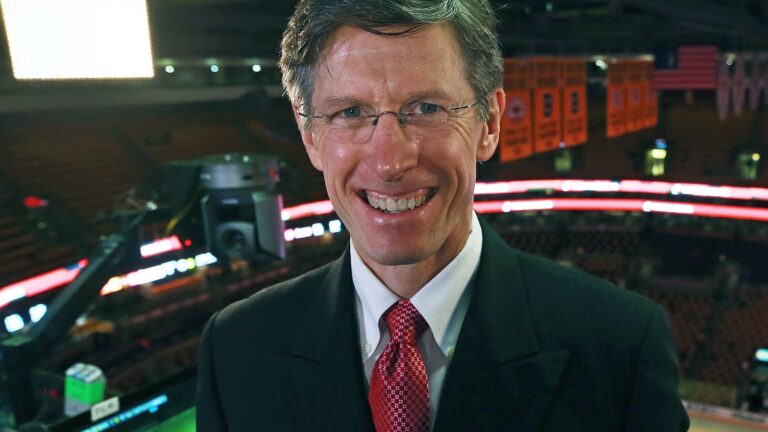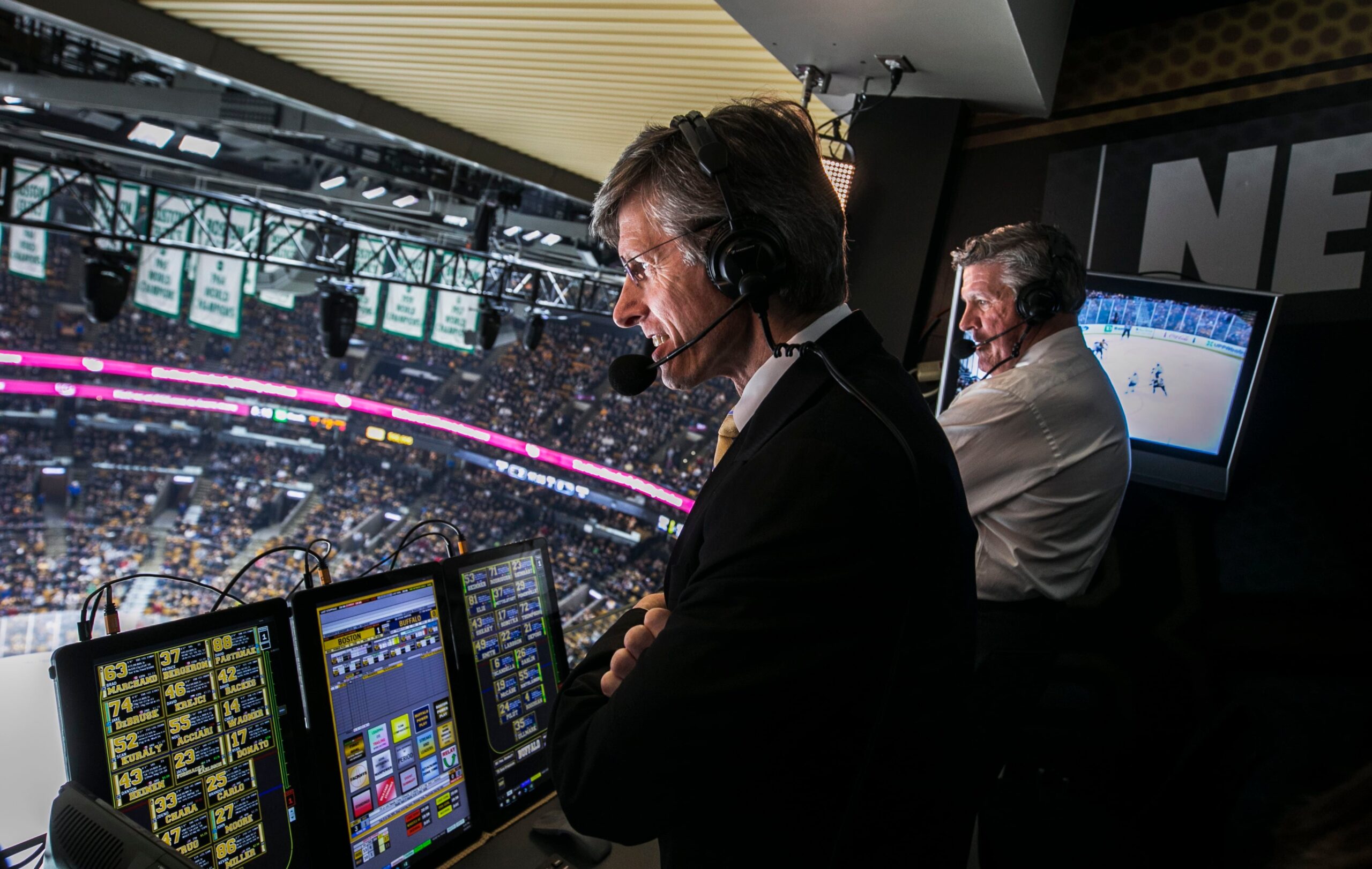Sign up for Bruins updates🏒
Get breaking news and analysis delivered to your inbox during hockey season.

The irony of his circumstances has not eluded Jack Edwards.
“The way I see it, two things work to my disadvantage,” says Edwards, who has been calling Bruins games on NESN since 2005 and as the exclusive play-by-play voice since 2007.
“The game is speeding up all the time. And I’m slowing down all the time.”
Anyone familiar with the work of the 66-year-old Edwards, particularly over the past couple of seasons, should understand his reference immediately.
He has sounded different in recent seasons. Slower. His speech is sometimes slurred. Certain words, unpredictably, require elongated enunciation.
Hockey is regarded by broadcasters as the most challenging sport to call, largely because of its rapid pace. Edwards, who has called hockey since his days at the University of New Hampshire, can sound as if he is stuck in a neutral-zone trap when he should be on a verbal breakaway.
It’s impossible not to notice, and it’s magnified if you have recently experienced the contrast of watching one of those vintage Bruins broadcasts — before Edwards’s speech pattern changed — that NESN often shows.
Edwards hasn’t discussed the change publicly until now. In part, he says, because his doctors remain mystified about what has happened.
“I did not have some kind of accident,” he says. “I do not have cancer. I don’t have dementia. I haven’t had a stroke. All of that’s been confirmed by Mass. General neurology.
“They’ve done tests that seem like I’m going through some sort of science-fiction scene, but it’s really true. The images of my brain literally reveal nothing. That’s my joke with them.”
Edwards says he has been given no specific diagnosis or medical term for the change. He says he is in “robust” health and grades out as “superior” on intellect tests his doctors have given him.
“It doesn’t fit in any slot,” he says. “There have been a couple of guesses, but they haven’t made a definitive diagnosis and they’ve been working on me for a year and a half. It’s very frustrating, as you can imagine, for me to have this slowdown in my speech.”

For Bruins fans who remember Edwards’s soliloquy on Patriots Day 2009 about “redcoats” and “ragtag farmers” after a Bruins win over the Canadiens, it may not come as that much of a surprise that his family has a tradition, started by Edwards’s late father, of reading aloud the Declaration of Independence on July 4.
It was during the annual reading in 2022 that Edwards realized his ability to speak at his usual pace had become compromised.
“The Declaration of Independence has quite a few unusual words,” says Edwards, “and a year and a half ago, I couldn’t process the words, and it’s not like it was unfamiliar. I’ve read it for, like, 20 years, 25 years.”
His daughter, now a senior at New York University, convinced him to visit his primary care doctor and seek speech therapy.
The doctor connected him with a neurologist, who ruled out dementia, a stroke, and other suspected possibilities. He was then referred to Massachusetts General Hospital.
“I meet with the smartest people I’ve ever known about every three months,” says Edwards. “They’ve done a battery of tests on me and I’ve met with research groups, plural.”
Edwards undergoes 40-60 minutes of what he says is “exhaustive and exhausting” speech therapy on non-game days and 10 minutes or so on game days. He had just completed his exercises before our phone conversation Wednesday.
“I thank all the people who are working on this problem and helping me, and they seem to feel and I anecdotally feel that I’m making incremental progress,” he says. “The brain is a funny thing, especially mine. It is still possible to train a 66½-year-old brain to do the same things you used to do in a different way. And that’s what we’re working on through speech therapy.”
Edwards does not partake in social media other than to post his line charts on X.com before Bruins games. But he acknowledges he’s heard the conjecture and speculation. And he gets questions about his situation, including from peers.
He mentions a play-by-play announcer for another NHL team who visited Edwards and analyst Andy Brickley in the broadcast booth before a preseason game in September.
“He said, ‘How’s it going?’ ” recalls Edwards.
“And I said, ‘Just fine.’
And he said, ‘So, how are the cancer treatments going?’ ”
Brickley, who has been alongside Edwards in the booth for his entire NESN tenure, has a subtle way of chiming in with just two or three words to help his partner catch up to the action when he’s lagging behind.
“Brick has been sensationally supportive and he’s the greatest teammate I’ve ever had,” says Edwards, while also noting the support of the production team, which has closed ranks around him since the speech issues arose.
Edwards says that Bruins fans have been nothing but encouraging and kind in person.
“Bruins fans are lovely and loving, and I have the benefit of the doubt with most of them,” he says. “I know intellectually that they know something is going on, but I have had nothing but encouragement from them face-to-face.”
He is told that this probably is the first time Bruins fans have been described as “lovely and loving.”
“Well, once you’re a member of the cult, everything looks different from inside,” he says with a laugh.
When asked to confirm his contract terms, Edwards simply says that he’s in the middle of a multiyear deal. Former Kings broadcaster Alex Faust, a Northeastern graduate, has been well-received while filling in for Edwards on a couple of occasions this season.
Edwards is genuinely hopeful that speech therapy will help him get back to where he wants to be. And if not?
“I’m treating it like an in-season injury, something that’s going to get better,” he says. “If I, or NESN, decide that I’m hurting the product or costing the fans an enjoyable experience, I will say goodbye. But we haven’t had any discussions like that.
“l love my job, but I know that retirement isn’t that far off,” he adds, noting that his retirement plan will be to ski roughly 100 days a year.
“I’m going to turn 67 next month. I hope to make a graceful exit when the day comes.”
Get breaking news and analysis delivered to your inbox during hockey season.
Stay up to date with everything Boston. Receive the latest news and breaking updates, straight from our newsroom to your inbox.
Conversation
This discussion has ended. Please join elsewhere on Boston.com